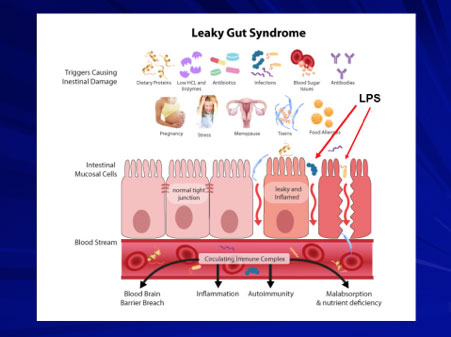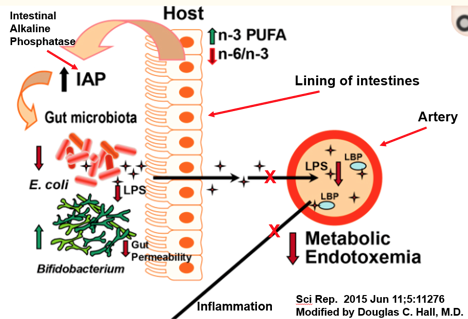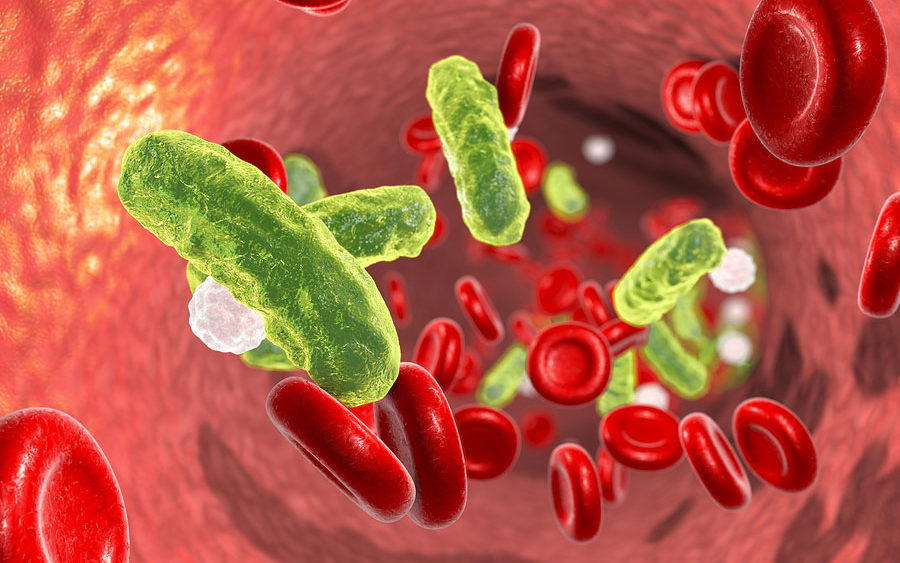Metabolic Endotoxemia: First, let’s break it in to understandable words.
- Metabolic: “pertaining to or of the nature of metabolism.” What is metabolism?
- Metabolism: Metabolism is the set of life-sustaining chemical transformations within the cells of organisms. The three main purposes of metabolism are the conversion of food/fuel to energy to run cellular processes, the conversion of food/fuel to building blocks for proteins, lipids, nucleic acids, and some carbohydrates, and the elimination of nitrogenous wastes. These enzyme-catalyzed reactions allow organisms to grow and reproduce, maintain their structures, and respond to their environments.
- Endotoxemia: First, endo means that it occurred within the body. Exo, would be outside the body. Toxemia, means toxins in the bloodstream. So, endotoxemia means toxins that were produced in the body are in the bloodstream.
Metabolic Endotoxemia: toxins in your bloodstream as a result of your metabolism.
As you can imagine, toxins (poisons) in your bloodstream is not in your best interest, regarding your overall health and life expectancy! Toxins in your bloodstream will lead to chronic low grade inflammation. Chronic low-grade inflammation is now considered to be a critical pathological factor underlying many modern chronic diseases, including diabetes, cardiovascular disease, cancer, and neurodegenerative diseases, and is associated with aging. (Nature 444, 860–867, J Nutr Biochem 24, 1183–1201)
Look at the adverse medical conditions that have been related to metabolic endotoxemia:
Diabetes, obesity, cardiovascular disease, cancer, leptin resistance, chronic constipation, depression, cognitive decline, loss of memory and recall, depression, anorexia, chronic pain, Parkinson’s, hypogonadism (low testosterone, estrogen, progesterone), autoimmunity, and aging! Looking back over the 44 years I have practiced medicine, metabolic endotoxemia could account for the cause of 99% of the medical conditions of the patients I have had the pleasure of treating! The cause of their problems was certainly not a deficiency of Prozac, Lipitor, Xanax, Viagra, or other medications! The question that functional medicine physicians ask is, “Where is the chronic inflammation coming from and how can I resolve this problem?” Research has revealed that it is coming from the intestines, the gut! What did the Ancient Greek physician Hippocrates state nearly 2500 years ago? “All Disease Begins in the Gut.” Why are physicians so reluctant to listen to this advice?
“We are more bacteria than humans- 10 trillion human cells verses 100 trillion bacterial cell. Bacterial genes outnumber human genes more than 150 to 1 (25,000 human genes versus 3.3 million bacterial genes).”How does the “gut” cause chronic inflammation? It is well-established that there are over 100 trillion bacteria in our “gut.” This is collectively called the microbiome. We are more bacteria than humans- 10 trillion human cells verses 100 trillion bacterial cell. Bacterial genes outnumber human genes more than 150 to 1 (25,000 human genes versus 3.3 million bacterial genes). What affect your microbiome? Age, diet, environment, antibiotic use, physiology, probiotics, and loosely genetics. The different types of bacteria in your microbiome carry out a variety of functions which are vital to not only your health and well-being but your very survival. The microbiome metabolizes your glucose and fat, aids in digestion, protein production, stores energy, improved ability to deal with stressors, such as toxins, decreased sensitivity to temporary diet changes, reduced risk of disease,better weight management, healthier metabolism and maintains balance of immune function. When the bacteria in the bowel are out of balance for many of the reasons listed above, that is called dysbiosis. The benefits listed above will be less than optimal. Dysbiosis can result in leaky gut. What is leaky gut (increased intestinal permeability)?
Look at the diagram below:

On the left side you will notice that the cells are very close together so the toxins will be excreted in a bowel movement. On the right side, the cells are separated so toxins in the bowel can enter your blood stream in the spaces between the cells and through the cells and cause the conditions as listed above. Now look at the top of the graph and you will see the many triggering factors that can result in leaky gut (increased intestinal permeability).
Again, when you have an imbalance of the bowel bacteria, an abnormal bacteria (gram negative bacteria called (Enterobactericeae) will increase and the good bacteria called (Bifidobacterium) will decrease. This creates the perfect storm for a disaster with regards to your health. The gram negative bacteria cell membrane is composed of lipopolysaccharides, an endotoxin, called LPS. LPS is increased in your blood after a fatty meal. The bacteria cell wall will pass through the leaky gut and attack every organ system producing potential medical problems such as diabetes, obesity, cardiovascular disease, cancer, leptin resistance, chronic constipation, depression, cognitive decline, loss of memory and recall, depression, anorexia, chronic pain, Parkinson’s, hypogonadism (low testosterone, estrogen, progesterone), autoimmunity, and aging! Look at the diagram below. The endotoxin, LPS is passing through the leaky gut into your bloodstream!

The functional medicine physician may ask again, “Why is this happening?”
Going back to the imbalance of the bacteria in gut. Could one cause be an imbalance of essential fatty acids? There are two major essential fatty acids. One is the Omega-3 fatty acid and the other is Omega-6 fatty acid. Every cell of the body is surrounded by a double layer of fatty acids, omega 6’s and omega 3’s. The Omega 6’s are pro-inflammatory and more likely to form a blood clot. The Omega 3’s are anti-inflammatory and less likely to form a blood clot. Lack of Omega-3’s and excess of Omega-6’s, make the membranes of your cells very rigid which make it difficult for hormones, nutrients and other chemical to enter your cell to perform their normal physiological function. It also makes it difficult for toxins you produced in the cell to exit the cell. Research shows that when the Omega 6 to Omega 3 is normal, it decreases heart disease by 90%!
“This study revealed that when the Omega-3 fatty acids are increased in the gut and the Omega-6 fatty acids are decreased, it decreases the gram negative bacteria {Enterobactericeae, E.coli} (that produce the endotoxin LPS!)”A high intake of Omega-6’s will decrease the absorption of Omega-3’s. In the standard American diet, the ratio of Omega-6’s to Omega-3’s is 10:1, that is 10 times more Omega-6’s than Omega-3’s. When the ratio is 4:1 or less, it may reduce total mortality up to 70% for up to 2 years! A study published in Sci Rep. 2015; 5: 11276, discussed the effect of Omega 3 fatty acid on the balance of the gut bacteria. This study revealed that when the Omega-3 fatty acids are increased in the gut and the Omega-6 fatty acids are decreased, it decreases the gram negative bacteria {Enterobactericeae, E.coli} (that produce the endotoxin LPS!) The Omega-3 fatty acids produce a chemical called intestinal alkaline phosphatase (IAP). The intestinal alkaline phosphatase will decrease E. coli and increase the good bacteria (Bifidobacterium) and that decreases leaky gut (increased intestinal permeability) and therefore not allow the LPS to enter the bloodstream which decreases metabolic endotoxemia!
“In the standard American diet, the ratio of Omega-6’s to Omega-3’s is 10:1, that is 10 times more Omega-6’s than Omega-3’s. When the ratio is 4:1 or less, it may reduce total mortality up to 70% for up to 2 years!”You say, “That doesn’t affect me, I’m taking fish oil!” But the question is, “Is it the right amount in relationship to the Omega-6’s?” Don’t guess, test!
Look at the summary diagram below.

The Omega-3’s increase, and the ratio of Omega-6’s to Omega-3’s decreases. This increases the production of intestinal alkaline phosphatase. This will beneficially alter the gut microbiota producing less E. Coli and more Bifidobacterium. This results in a decrease in production of LPS and decreases gut permeability! Collectively, there will be a marked decrease in LPS entering the arteries and produce less inflammation.
Blood tests are available to determine leaky gut and determine your LPS level through Dunwoody Labs. Please contact my office at 352-629-7955 and schedule your blood test for LPS and your Omega -6 to Omega-3 ratio.
I hope this information has been helpful.

About the Author
Douglas C. Hall, M.D.
Dr. Douglas Hall, was born in Indianapolis, Indiana on Jan. 30, 1941. He received his BS and Doctor of Medicine at the University of Florida, training in obstetrics and gynecology. Dr. Hall has been in private practice since 1974 and currently has a large practice in Ocala, specializing in OB/GYN and Functional Medicine.


